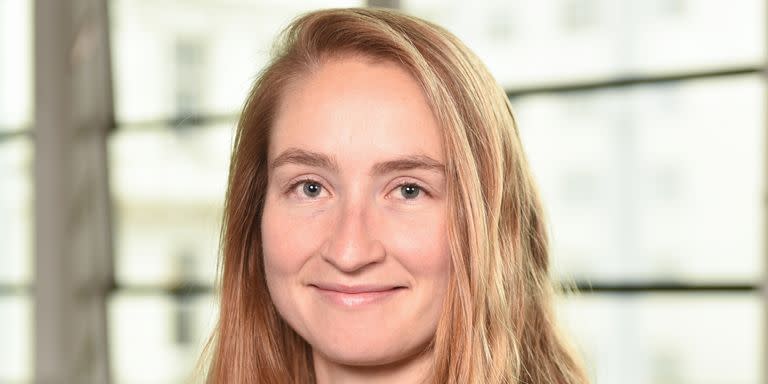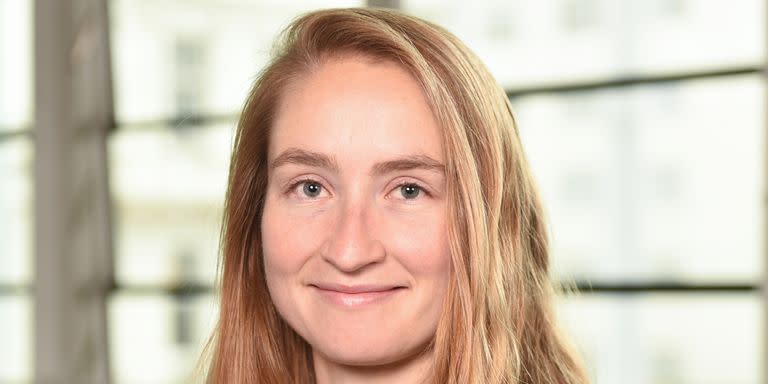Meet The Woman Leading The Race To Develop A Coronavirus Vaccine

Dr Anna Blackney is a Marie Sklodowska-Curie Research Fellow at Imperial College London with a PhD in Bioengineering
'The commute to work is the weirdest part. The whole of Imperial College London has shut down, but eight of us scientists are deemed key workers and we’re allowed into the lab every day to develop and test a COVID-19 vaccine.
Where normally the roads would be full of cars, cyclists and commuters, it’s eerily quiet when I walk to Imperial’s St Mary’s campus at 7am every day.
But with such a small number of people in the lab – we’re normally a team of thirty - there’s a strong feeling of teamwork and camaraderie. There’s also so much going on; everyone needs to be helping out as much as they can. But morale is good right now as the tests we’re doing are coming back positively.
In some ways, life has changed drastically for us since the Covid-19 outbreak. I’ve been working on this vaccine platform for the past three and a half years now, but since we received the sequence of the virus from China in January, our focus has been on this particular coronavirus.

We were lucky with COVID-19 in a way, because it’s quite similar to both Sars and Mers and so when the sequence came out, we were able to easily identify the glyco-protein on the surface of the virus, which has helped us to develop the vaccine.
But this is the fastest we’ve ever worked in the lab and, as time goes on, the need for a vaccine becomes increasingly important. When we first started working on it, we were sceptical that it was going to make a difference, because it didn’t seem like the spread of the virus was going to get this out of hand.
For me, that switch flipped when it began infecting so many people in China, but then also spreading to other countries. It became apparent that this virus didn’t respect any borders, it’s infecting everybody globally.'
How Close Are We To Having A Coronavirus Vaccine?
'Viruses have evolved to get into cells really efficiently. When you’re making a vaccine, you’re really trying to trick your body into making it think that it’s infected with the virus, so if it is actually exposed you have an immune response to it.
There’s a common misconception between a prevention and a treatment. A vaccine is always a prevention. The idea is that it prevents you from ever getting infected with COVID-19.
We’re currently three weeks into our first study. The test subjects will receive two doses, one month apart. Soon we’ll be able to see how successful the first study is. The main test that we’re looking for is antibodies in the blood, and how many of these are specific to the coronavirus.
Prof Robin Shattock’s team have developed a vaccine candidate that will shortly be ready for human trials https://t.co/dlUh856Bpp
— Imperial College (@imperialcollege) March 26, 2020
We’ve already got some data from the tests and they’re showing quite high antibody responses, so that’s really promising. It’s exciting when the tests results show positive signs, because it means we’re one step closer to starting clinical trials, hopefully in June.
Because of all the steps you need to do before you put it into humans, we won’t have a licensed vaccine before next year. For many, this seems like such a long way away, but people underestimate how much time it takes to get a vaccine out there. It can take years, even when it’s rushed.
But to make it more impactful for the population, we’re trying to design our clinical trials to be as big as they possibly can. So, we had originally thought about including thirty people in Phase 1, but we’re going to try and include 120. Then for Phase 2, we’re going to try and include 5,000 people. It’s a way to theoretically get it out to more of the population without having a licensed vaccine. The aim is to get it to people because we think it works and it will make a difference.'
Are You Feeling The Pressure?
'For the most part I don’t find it stressful knowing that the entire world is waiting for a vaccine to help cure coronavirus. As scientists, we’re really in it to be able to have a positive impact on human health. Now is an opportunity to do that in a really direct way.
For me, the pressure is more of a motivation or an opportunity because, as a scientist, it’s what we do this for. We’re also realistic about the possibility of failure. In science, things fail all the time, that’s how you make progress.
While we’re working hard here, we’re aware of other scientists around the world who are also trying to find a vaccine. But it doesn’t feel competitive, more synergistic.
Are Others Making A Vaccine For Coronavirus?
I think we’re realising more and more the scale of people affected by this. It’s probably not going to be one person, or one group of people, that makes a vaccine for the entire world, because it’s billions of vaccine doses that we’d need to be making. If you look at it this way, it’s really useful that so many people are working on it.
Just as there have been signs of stronger community elsewhere, scientists have been really good at sharing information and helping others to make progress. It’s been really beautiful how the scientific community around the world has been mobilising and communicating.
Everyone feels very united in this pandemic because it’s affecting everybody, there’s no point trying to keep it a secret because by helping others you’re also helping yourself.'
How Do You Stay Safe In The Lab?
'We’re being really diligent about washing hands and staying away from each other as much as possible, and then also cleaning the common surfaces as much as we can.
I haven’t had any signs or symptoms so far. I live with two flatmates who are both working from home. Neither of them are scientists so when I get home we do talk about how my day has been: they’re interested in how it’s going and it’s cool for them to get an inside perspective.
While I’m working in the laboratory I try and limit the amount of news I’m reading because I think it affects my mental state when I dive down a corona-hole. I also try and keep a semblance of normality by going running or doing online yoga.
My parents live in Colorado, where I’m from. A vaccine has such a potential to impact so many people in society, so this is personal in a way because there are loads of people I know who are exposed to it as well. I know it would benefit so many people around me.
I was supposed to be going skiing in Colorado last week, but with borders starting to close and flights becoming rarer I decided beforehand that I wasn’t going to go.
There wasn’t much point going home because I’d just be sitting inside there. Whereas if I’m here, I can at least come to work and contribute to this pandemic and do my job. I think everyone’s going to deserve a holiday when this is all over.'
Dr Anna Blackney is a Marie Sklodowska-Curie Research Fellow at Imperial College London with a PhD in Bioengineering
Like this article? Sign up to our newsletter to get more articles like this delivered straight to your inbox. SIGN UP
You Might Also Like


